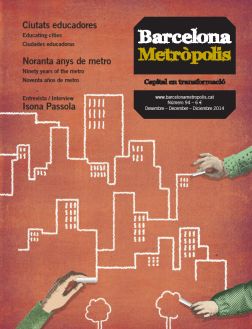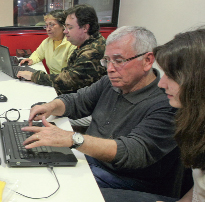In the town of Viladecans, the project Awi.net gives courses in digital literacy that pair up one senior citizen with one young person, who may or may not be a member of the same family.
Can you remember when you first used a mouse, had a mobile in your hand, or learnt to use a touch screen?
Knowing how to use these tools in more than a simply instrumental way makes us digitally competent. The separation that exists between those with this competence and those without, be it due to lack of experience, access or habit, is called the digital divide. This disparity can have a considerable influence on people’s development.
Digital inclusion means facilitating access to information and communications technology for all of society, while also overcoming other societal divides caused by factors such as age, gender, education, culture, economic background, etc. There are many practical learning experiences that aim to bring technological know-how to difficult-to-reach communities. For example, programmes brought to sections of the elderly population, such as the one the Fundació Ciutat de Viladecans brings to its own municipality in the Barcelona metropolitan area.
An analysis of the state of digital literacy in 2011 showed that 40% of Viladecans residents did not have internet at home and had almost no knowledge of the web and its uses. This realisation has given rise to a great effort to reduce the digital divide and become a socially smart city, where technology can help improve people’s quality of life in areas such as health, mobility and education.
The Fundació Ciutat de Viladecans has six computer classrooms where it runs digital literacy courses and workshops, which have over five hundred participants per year. 2011 also saw the start of the project Awi.net, which is most active in the neighbourhoods where the population without internet access or knowledge is concentrated – mostly comprising people over the age of sixty. These activities build up people’s self-esteem, as they help them to discover new abilities and to become more aware of their place in the community.
Awi.net runs digital literacy courses with digital pairings, in which elder members of the community are guided into the world of the internet by their grandchildren or by other members of the youngest generations. The project represents a shift away from normal roles, as adolescents assume the position of teacher in a field where they have the greater expertise. Hundreds of pairings have been made, and they work for four sessions of an hour and a half each, in which the young person has teaching materials and support from a monitor. The sessions take place in a computer classroom at a municipal resource centre for young people, although there is also the option of doing them at home if the two partners belong to the same family.
The younger partners teach senior citizens how to use the internet, conduct searches, look things up on Wikipedia, watch videos, visit all kinds of websites, set up an email account and use it, create a profile on a social network and hold a video conference. The senior citizens learn how to resolve doubts on any topic, manage their bank account, look up transport timetables, connect with relatives, make medical appointments, read the newspaper, do the shopping, etc. – positive, functional and meaningful activities that are useful in everyday life.
The project also facilitates intergenerational contact and encourages values such as commitment, patience and teaching. In the end, everyone is a teacher, because the young end up learning these values from the elderly during the time they spend together.




